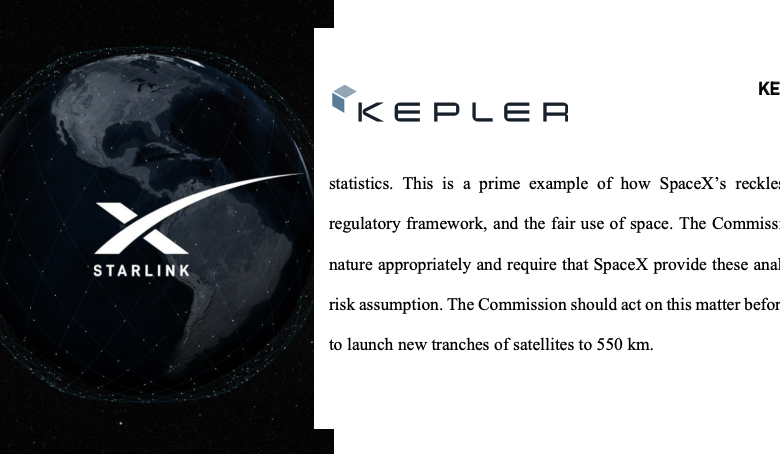The recent news that Elon Musk would like to launch a further 30, 000 satellites as part of his company’s Starlink mega-constellation has provoked an outcry within the industry as satellite communication firms start lining up to complain to the FCC about the size of SpaceX’s intended space-borne internet system and the manner in which they went about it.
If SpaceX hold true to their word, then within the next decade, the billionaire's Starlink orbital internet platform could see its numbers swell to to 42,000 satellites – a staggering amount of objects for any one company alone.
It is not surprising then, that other big-named companies, each with plans to expand their own networks in space foresee a huge problem with Musk’s ambitious strategy. And they are not keeping quiet about it. In the last few days, Kepler Communications, WorldVu Satellites Limited (“OneWeb”) and SES Americom, Inc have all filed paperwork with the FCC to oppose Musk’s request of additional satellites, with some branding SpaceX as being ‘reckless’ and disrespectful.
“Using NASA’s Orbital Debris Assessment Software and the techniques described in NASA’s Orbital Debris Engineering Model 2000, it found that the introduction of these satellites to the 550 km region caused its probability of collision with large objects to increase by a factor of 3.01x,” writes Kepler Communications, a privately held company based in Canada, in a letter sent to the Federal Communications Commission (FCC) on 15 October, 2019.
Toronto-based Kepler, which currently has two satellites in orbit, has plans to eventually operate an internet-of-things constellation with 140 cubesats at an altitude of 575 kilometres.
Kepler CEO Mina Mitry has however already hinted at potential changes to its constellation after the US FCC granted SpaceX permission earlier this year to lower 1,584 Ku-band Starlink satellites from a planned altitude above 1,110 kilometres to one of 550 kilometres. Undeterred, Mitry told SpaceNews at the time of the decision, “that impact can be managed if the right burden is placed on the operator that is causing the undue hardship on us,” .
This new request by SpaceX though is a further blow to the company’s plans. “The current orbital debris rules were never designed to account for modifications that could have a material impact on large-scale orbital debris statistics. This is a prime example of how SpaceX’s reckless ambition strains the existing regulatory framework, and the fair use of space,” Kepler’s letter adds.
Satellite operator SES are not to happy about it either. In their letter to the FCC, also filed on the 15 October, SES request that the Commission defer consideration of SpaceX’s intention to modify its license for a Ku/Ka-band non-geostationary orbit as “SES entities operate both NGSO and geostationary orbit (“GSO”) FSS networks that use these bands.”
Not only is that a problem say SES but they also suggest that SpaceX’s method of bombarding the regulators with so much paperwork is a somewhat underhand tactic to slow down their own satellite launches.
“According to ITU records, SpaceX has submitted a total of twenty ITU filings – all with an October 7, 2019, registry date – to be evaluated in connection with its NGSO system. On its face, this suggests that SpaceX is attempting to evade the single-entry EPFD limits for its satellite network by dividing the network into multiple parts and asking the ITU to evaluate them separately. Leaving aside the propriety of this approach, the simultaneous submission of so many filings will drastically slow down the ITU’s review process.
“Assuming it takes the ITU two to four months on average to review each filing, even if it started immediately, the ITU would not complete its findings regarding the whole set of SpaceX filings until some time between early 2023 and the middle of 2026. Yet even that completion schedule may well be optimistic,” write SES.
Following suit with further disapproval of SpaceX’s “grandiose ambitions”, OneWeb’s letter of complaint is equally scathing about the company and its practices when it comes to filing paperwork; SpaceX’s STA Requests, “are a clear attempt by SpaceX to circumvent the Federal Communications Commission’s (“Commission”) well-established review process for pending applications, SpaceX’s second such effort this year,” write OneWeb.
In their letter, sent to the FCC just yesterday (17 October, 2019) OneWeb urge the FCC to take seriously the orbital debris and radio frequency interference issues highlighted by Kepler, because state OneWeb, “SpaceX has already failed to live up to its assertion that “SpaceX satellites will continue to perform conjunction avoidance” during the de-orbit period, as a “bug in [SpaceX’s] on-call paging system” prevented SpaceX from avoiding a potential collision with an ESA Aeolus satellite, forcing the Aeolus satellite to perform a collision avoidance maneouver.”
All of which leads OneWeb to conclude that SpaceX’s latest modification request should be in no uncertain terms, denied.
SpaceX certainly seem to have a fight on their hands and no doubt there will be a few interested parties waiting to see if the company responds to these complaints lodged with the FCC. Perhaps Musk's reply might also provide some clarification as to why the company submitted these 20 separate filings on the same day.











